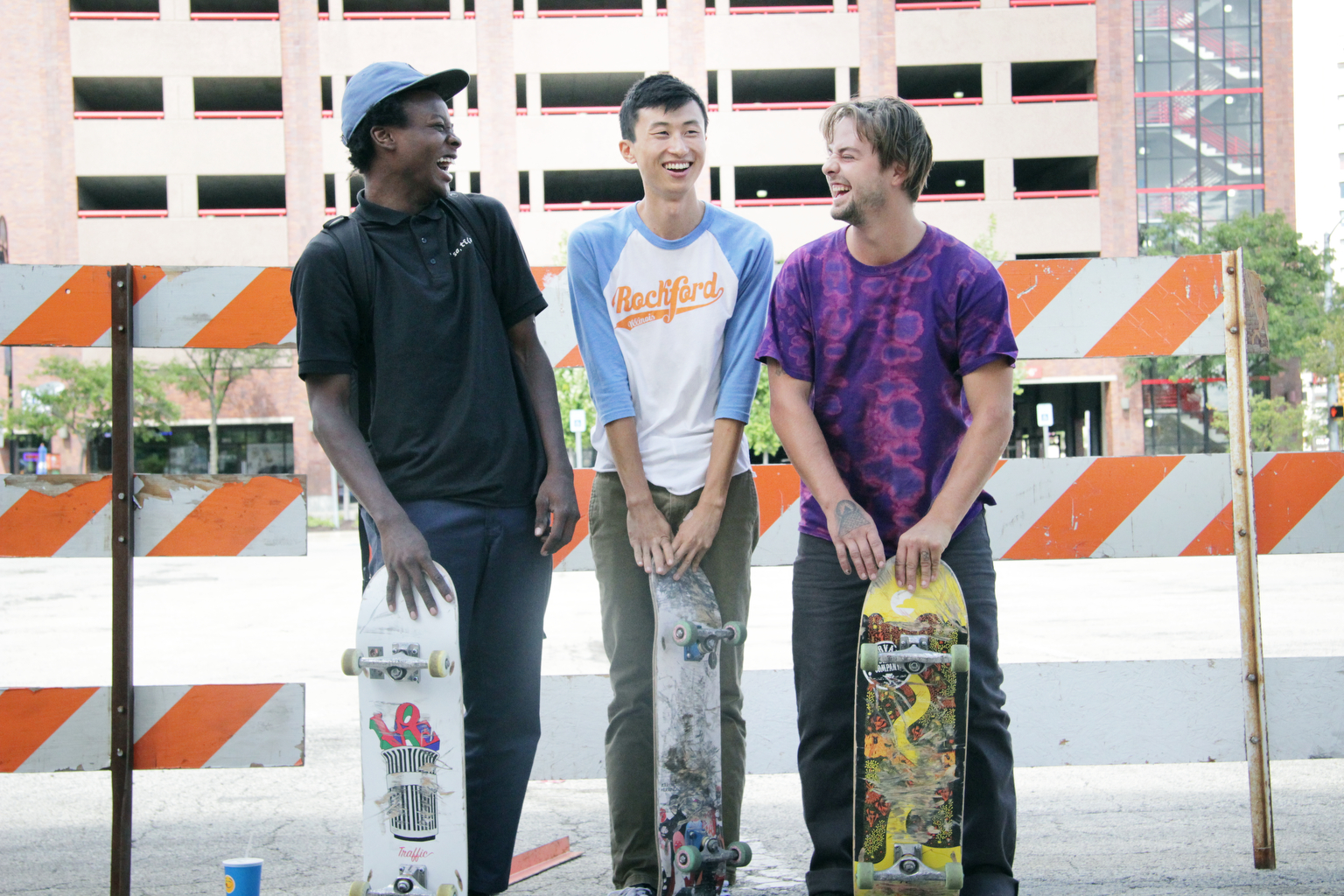No one escapes the working class without guilt. You spend your life knowing that from such accidents as the ability to take tests, you won—you did not earn—reprieve from endless physical labor, chronic pain, death by opioids. Because you could turn a phrase, no guidance counselor looked at you, as they looked at some of your peers, and decided you weren’t that most nebulous of things, “college material.”
The documentarian Bing Liu is such an escapee from the working class, and in his film Minding the Gap—now streaming on Hulu—he returns to his old friendships with neurosis-free clear-sightedness. As a teenager in Rockford, Illinois, in the 2000s, Liu spent countless hours skateboarding with his friends Keire and Zack; the sport permitted—in fact embodied—freedom from their tyrannical and abusive fathers. He braids his old skate videos of them with new footage to create a masterpiece of cinéma-vérité personal filmmaking.
As the film begins, Bing, Zack, and Keire sneak into a parking garage, skate all the way down it, then ride the resulting momentum for an impossible number of minutes. It’s the kind of purely kinetic cinema that makes you want to climb trees and take stupid risks. Then, soon after, you hear Keire’s present-day voiceover as he walks through his mother’s house: “I spent the majority of my time here alone.” Gravity evaded; gravity triumphant.
Keire resents and, over the course of the film, reassesses his father, whose disciplinary methods Keire describes as “child abuse.” Early in the film, you see video of young Keire after fighting off other boys at a skate park; he stands breathing hard, unable to speak. He has won the fight, but he’s as angry as if he’d lost; it’s the anger—displaced and unaccountable—of every kid who has ever been spanked with a belt. But Keire’s father was also a black man, enacting a pattern that is as easy for outsiders to judge as it is impossible for them to argue away—“If I beat the kid, perhaps they won’t.” (At one point Keire laughingly recounts his inevitable, and fortunately nonlethal, encounter with a trigger-happy policeman; the viewer feels the shock and anger he has learned to suppress.) He comes to see the frustrated love behind his father’s sternness.

Zack’s charisma burns brightly; he has a sort of sleepy, sloppy handsomeness. At first he’s the most sympathetic of the three—his boss won’t give him enough hours and he takes to the role of stay-at-home parent as well as anyone ever does. His girlfriend, Nina, comes home from her fast-food job ready to go out again, to drink and party, because she’s just 21 and already facing the existential terror of the sole breadwinner. Zack, like a 1950s housewife, wants her to stay home so he can talk to an adult. Can you blame either of them? But their fights escalate; Zack presents Liu with audio evidence that Nina hits him. Nina responds with credible abuse accusations of her own. Zack confirms them, first in an ugly rant (“Some bitches need to get slapped sometimes”), then in a searing self-confrontation, which, let’s hope, represents a turnaround.
Liu’s dead stepfather, too, was a monster, and Liu confronts his mother, a Chinese immigrant, in a harrowing sequence—his camera on her, another camera on him, pain entering the system but unable to leave. “I wish I go over, do again, do differently,” she says. But consider her situation: an immigrant pursued, perhaps stalked (it’s not clear from her description), by a citizen with a pension. I thought of an incident described in Matt Taibbi’s The Divide, in which a welfare-fraud investigator tosses a Vietnamese immigrant woman’s underwear drawer, looking for evidence that she’s taking gifts from men. This is the kind of treatment Liu’s mother could expect for herself, and for her child, lifelong, without the protective covering conferred by this man, who might, if she did not acquiesce to a relationship, force himself upon her anyway. The awful parents whose indefensible choices we spend our lives recovering from are, so often, good, brave people picking from among the most depressing options imaginable.
Neither Zack nor Keire seems to resent Liu for his success, and nothing in his treatment of them, throughout the film, hints at condescension. This grace, at least, is unusual, on both sides of such a relationship. It gives you some hope—not necessarily for their future but for their, and our, present. Bing Liu is a filmmaker of unusual humanity; Keire seems like a good, insightful, kind person; Zack has at least begun to face his demons, which is more than many abuse victims ever do. Any better world must begin in the radical potential buried within partial, present-tense, hard-pressed decency.
